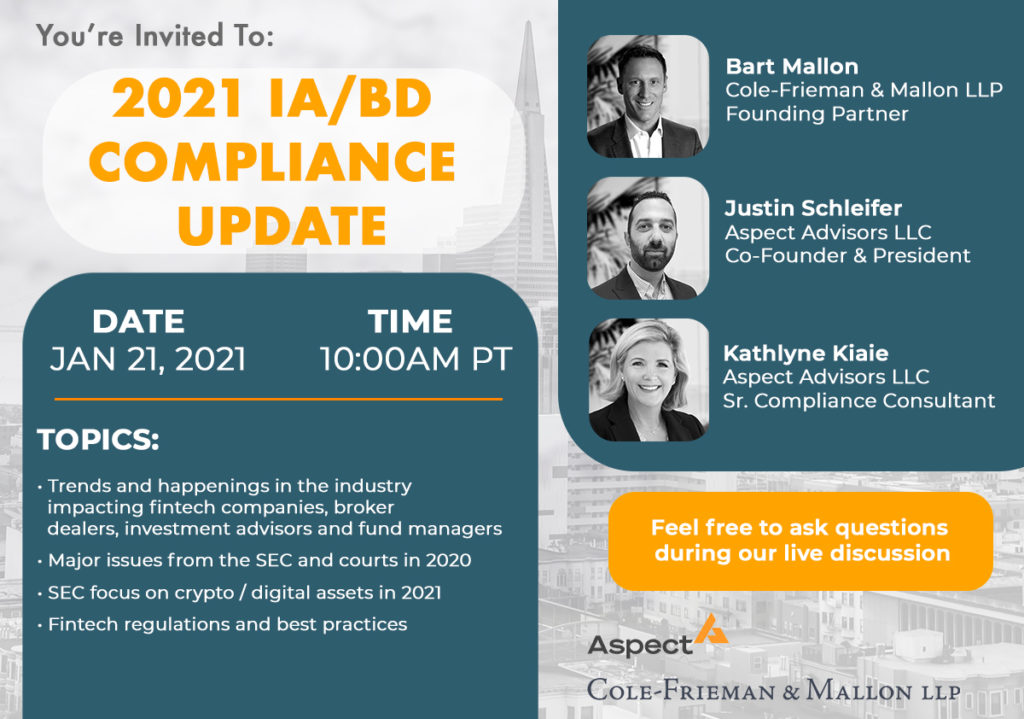A while ago we mentioned that we were hosting a compliance update for investment advisers and broker-dealers. The below is our summary of that event.
****
We wanted to take this opportunity to thank everyone who attended and participated in our 2020 compliance update with Justin Schleifer (Aspect Advisors) and Bart Mallon (Cole-Frieman & Mallon). We understand that compliance sometimes feels like an obligation. Still, we think that our discussion last week touched on many important items for financial industry professions to keep top of mind in this new year and new decade.
We have attached a copy of the presentation to this email. Please feel free to forward along to anyone who might be interested. Some high points included:
- High level trends influence how the modern investment manager interacts with compliance. Trends include the ongoing bull market, the movement of investment dollars from public investments (via IPO) to private markets, and the emergence of technology/ fintech. While these are distinct trends that need to be acknowledged, traditional compliance concepts still apply to managers although the concepts may be deployed or utilized in a different way than before.
- Regulation Best Interest (“Reg BI”) will have an impact on the investment management industry in 2020. Broker-dealer and IA firms will scurry to meet the Reg BI implementation deadline. The effects will be felt more keenly by broker-dealers as they revise their practices to account for the updated fiduciary standards. Asset managers will need to address the regulation through a new Form CRS (sometimes referred to as ADV Part 3).
- Privacy is paramount. There is general momentum toward consumers craving privacy. Governments and regulators are taking baby steps but are expected to do more in the future – we see that things such as the California Consumer Privacy Act and GDPR have already begun to influence the operations of many investment management companies. While managers should always maintain fundamental compliance records, there will be changes in the way that investor and customer data is ultimately accessed and available. It is therefore important for managers to stay up to date with those advances and any accompanying compliance processes.
- Technological innovation (in both traditional and digital asset markets) is stretching the regulators’ ability to keep up. Regulators have trouble attracting talent to head new divisions to deal with technological innovation. Accordingly, money managers and entrepreneurs utilizing new technologies will need to understand the necessity of being able to explain the use of technology to regulators.
- Access to new capital? The industry is always looking for ways to get new investors involved. A new accredited investor standard has been proposed but is not likely to significantly expand the pool of potential accredited investors and thus capital available for investment. Similar initiatives to broaden the distribution of investment products or management to a broader base of end investors (such as Regulation CF, Regulation A+, and 506(c) general solicitation) have seen generally middling to poor results for various reasons.
- Information Security/Cybersecurity will continue to be a big regulatory focus and focus on this area is a business best practice. Larger firms will outsource to high tech IT firms or bring IT talent in-house. Smaller firms have many basic tools at their disposal and should focus on vendor management and selection, employee training, access to information, and other pivotal ways to increase security (2FA, using non-public wifi, port blockers, screen protectors, etc).
- Taking humans out of investment management. Many investment management companies are creating organizations to bring services to the masses; these companies scale to limit human involvement. Questions on how to deal with compliance on a larger scale naturally emerge. The integration of technology (including with outside compliance vendors) becomes a key focus and commensurately decreases the reliance on human capital.
- Other smaller trends have emerged. The focus on private markets is expected to heat up, not decrease (WeWork notwithstanding). Firms will continue to expand with sophisticated financial services, tools, investment strategies, different products, and new market participants, especially as millennials begin investing and saving more. As technology improves lower-fee products proliferate; many firms charge very low management fees and rely more on performance fees.
We look forward to seeing you again at a panel event in the future and wish you the best during this first quarter.
Regards,
Bart Mallon & Justin Schleifer
Aspect Advisors LLC
Aspect Advisors LLC is modern regulatory consultant providing customized compliance solutions to entrepreneurs. The firm has a focus on fintech companies, broker-dealers, and investment managers (hedge fund, VC, PE, RIA, etc). We provide compliance and back-office solutions engineered to decrease worry and save time and resources. Among other items, the firm helps clients with regulatory registration, drafting compliance policies and procedures, conducting annual reviews, and other bespoke items.
Cole-Frieman & Mallon LLP
Cole-Frieman & Mallon LLP is a premier boutique investment management law firm, providing top-tier, responsive, and cost-effective legal solutions for financial services matters. Headquartered in San Francisco, Cole-Frieman & Mallon LLP services both start-up investment managers, as well as multi-billion-dollar firms. The firm provides a full suite of legal services to the investment management community, including hedge fund, private equity fund, venture capital fund, mutual fund formation, adviser registration, counterparty documentation, SEC, CFTC, NFA and FINRA matters, seed deals, hedge fund due diligence, employment and compensation matters, and routine business matters. The firm also publishes the prominent Hedge Fund Law Blog, which focuses on legal issues that impact the hedge fund community. For more information, please visit us at colefrieman.com.
****
Bart Mallon is a founding partner of Cole-Frieman & Mallon LLP. Cole-Frieman & Mallon has been instrumental in structuring the launches of some of the first digital currency-focused hedge funds. For more information on this topic, please contact Mr. Mallon directly at 415-868-5345.
